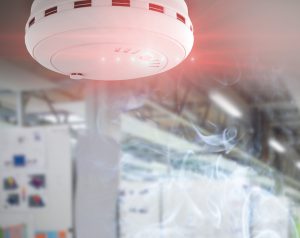
Most states follow the guidelines established by the National Fire Protection Association (NFPA). But there are some variables. For example, effective Jan. 1, 2023, Illinois law requires homes and apartments to replace smoke alarms more than 10 years old with long-term detectors that house 10-year sealed batteries. Homeowners could be fined $100 for failure to do so. (Homes built after 1988 with hardwired smoke alarms are exempt, as are homes with wireless alarms that use Wi-Fi, low-power radio frequencies, or some other wireless local-area networking.)
It is incumbent upon electricians, builders, and inspectors to keep up with these changes and to accept that NFPA 72 is the real driver as to requirements and placement of smoke alarms/carbon monoxide detectors.
–Joseph Alexander, chief building official, City of Suwanee, GA
Here are a few of the basic NFPA guidelines for CO and smoke detectors plus some changes from 2022.
Construction, Electrical Updates for Smoke Detectors
“The mandate to install smoke detectors at control units, power extender panels, and supervising station transmitting equipment has been a matter of debate,” says Mobile Communications America. NFPA 2022 allows for a risk assessment to be performed by your local AHJ (authority having jurisdiction) to determine the need for early detection at control equipment.
Other focal points and modifications include:
- Abandoned smoke detectors must be labeled “out of service” and removed from commercial properties.
- Battery amp-hours increased from 20% to 25%. Smoke alarms’ primary power must be from the building’s wiring with rechargeable battery backup.
- Circuits must have 1-hour fire protection through:
- Cable systems
- Fire rated-enclosures
or - Fire-rated circuit integrity cables
- Emergency digital signage must now be manually controlled and reset by emergency personnel.
- Units should be interconnected, including wireless.
- “Where alterations, repairs, or additions requiring a permit occur, the individual dwelling unit shall be equipped with smoke alarms located as required for new dwellings (IRC Sec. 314.2.2).”
By nurturing our core values, we have become the #1 source of building permit information that is demographically targeted for construction management. Let Construction Monitor provide project data for business-building incentives. Contact us today.
